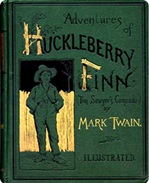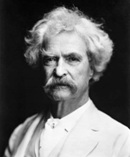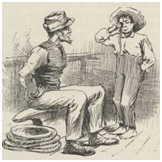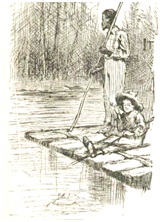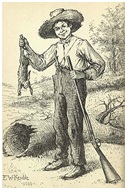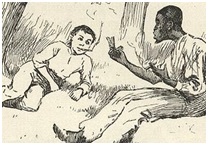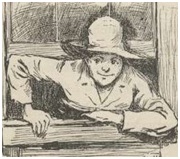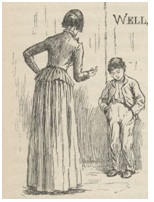|
 |
|
 |
The Adventures of Huckleberry Finn - Ethics and
Racism
The Adventures of Huckleberry Finn (1884)
Set about 1840 around the Mississippi River, where he grew up and worked. Fun facts
Key characters Huckleberry Finn (Huck), a 13-year-old boy and the book’s narrator. Tom Sawyer, Huck’s friend. Widow Douglas and Miss Watson, sisters who adopt Huck Jim, Mrs Watson’s slave Pap, Huck’s father The story Huckleberry Finn (Huck) is a poor boy (with a drunken, violent father, Pap), who has been adopted by the kind Widow Douglas and her self-righteous sister, Miss Watson. They live around 1840 in St Petersburg, Missouri, on the Mississippi River. Huck’s best friend is a middle class boy, Tom Sawyer (pictured right in Twain's 1876 book, The Adventures of Tom Sawyer) Despite his reservations, Huck goes along with Widow Douglas’s and Tom’s attempts to make him respectable or
“sivilized”. (polite, schooled, religious and obedient). Everything is fine until Pap returns, harassing Huck (pictured right together) and demanding money from him (Huck has received $6000 from treasure he and Tom found). When Widow Douglas infuriates Pap by telling him to stay away from Huck, Pap kidnaps him, taking him to a cabin across the river from St Petersburg. Whenever Pap goes out, he locks Huck in the cabin and beats him on returning drunk. So Huck escapes, hiding on Jackson’s Island in the middle of the Mississippi. He meets Jim, one of Miss Watson’s slaves. He has run away after hearing her say he would be sold to a plantation owner and separated from his wife and children. Huck teams up with Jim, despite his doubts about helping a runaway slave. After the river floods, a log raft and houseboat float past the island. They capture the raft and find the body of a shot man in the boat. Jim does not let Huck see his face. They have to leave the island when Huck learns from a woman on the mainland that her husband believes that Jim is hiding there. He also discovers that a reward has been offered for Jim’s capture. They start downriver on the raft heading for the mouth of the Ohio River and so to the Northern states where slavery is prohibited. Then they pass St Louis, encounter a gang of robbers ,miss the Ohio River in thick fog and meet a group of men looking for escaped slaves. Huck lies to the men, saying his father is on the raft suffering from smallpox. Terrified of
the disease, they give him money and hurry away. Unable to return to the mouth of the Ohio, Huck and Jim continue downriver. A steamboat hits and separates them. Huck ends up in the home of the kind Grangerford family, Southern aristocrats, locked in a bitter feud with the neighbouring Shepherdsons. The elopement of a Grangerford daughter with a Shepherdson son leads to a gun battle, killing many in each family. Jim then shows up with the repaired raft and takes Huck off down the river again (pictured right in the first edition). Several days later they are joined by two con men (called the duke and the dauphin)after rescuing them from armed bandits. After several scams in small towns along the river, the duke and the dauphin hear the story of a man, Peter Wilks, who has recently died and they pretend to be his two brothers and main benefactors. They are welcomed and then paid by Wilks’s three nieces. Huck likes them and reveals the scam to the eldest girl, Mary Jane. Then the real brothers arrive. The con men escape, re-join the raft and, some time later, sell Jim to a local farmer, saying he is a runaway slave for whom a large reward is being offered. Whilst searching for Jim, Huck meets Tom Sawyer’s aunt and uncle, Silas and Sally Phelps, at their farm, where Jim is being held. Huck and Tom Sawyer (who has arrived for a visit) manage to free Jim but a pursuer shoots Tom in the leg. Huck is forced to get a doctor and Jim sacrifices his freedom to nurse Tom. The next morning Tom reveals that he has callously let Huck and Jim escape as an “adventure”,, knowing that Miss Watson has been dead for two months and given Jim his freedom in her will. Jim tells Huck that the dead body in the houseboat was his father, Pap. Aunt Sally offers to adopt Huck, who instead plans to go West, fed up with people trying to make him respectable (what he calls “sivilizing”).
What does it say about ethics? 1. Ethics isn’t easy What’s right or wrong isn’t always clear-cut. For example, Huck (pictured right in a first edition drawing) helps a runaway slave, Jim, even though it’s illegal. He also discovers you may have to do wrong to do right, when he lies about his father’s smallpox on the raft to protect Jim.
2. Racism and slavery are wrong Slaves like Jim are treated as nobodies who can be sold and separated from their families. For example, Tom doesn’t tell Jim about his freedom. Huck's attitude to Jim changes from:
3. Be kind Jim is a selfless hero, despite the danger and degradations he endures. He:
Jim cooks for Huck and shelters him from horrible events like the sight of his dead father’s body.
4. Be a non-conformist and think for yourself Huck finally rejects “sivilizing” because so-called civilized people like Tom and his Aunt Sally and Uncle Silas are indoctrinated (through education and social pressure) to treat black people horribly. So Huck chooses to “go to hell” rather than follow the rules of society and racist religion. His conscience wins over blind obedience. 5. Think before you act Huck (pictured right) learns the value of quietly reflecting on what to do before he takes action in his decision to help Jim.
6. We all need somebody to love Huck has no really close friend except Jim. His mother is dead and his father is a violent drunk. One night at Miss Watson’s, he goes to bed feeling: “so lonesome I most wished I was dead”. 7. Nobody is perfect Everyone in the book has faults, even Jim, who tells Huck about his deep regret over beating his daughter when she did not deserve it. Miss Watson frees Jim, but she waits until her death to do it! Huck is pictured right being told off by Miss Watson.
8. We don’t know everything Huck and Jim’s dangerous adventures show that they had to take decisions based upon imperfect knowledge. Tom hadn’t told them that Miss Watson had freed Jim.
9. Forgive and forget The bloody feud between the Grangerfords and the Shepherdsons shows how pettiness can escalate into tragedy.
10. Hate hypocrisy Huck sees so-called Christians who don't love but kill, defraud and support slavery The only true Christian is Jim.
Key quotes on ethics I took ... up [the letter I’d written to Miss Watson] and held it in my hand. I was a-trembling, because I’d got to decide, forever, betwixt two things, and I knowed it. I studied a minute, sort of holding my breath, and then says to myself “All right, I’ll go to hell!” – and tore it up, Huck (on his decision to help Jim). Human beings can be awful cruel to one another, Huck Just because you’re taught that something’s right and everyone believes it’s right, it don’t make it right, Huck I do not wish any reward but to know I have done the right thing, Tom (in an anonymous letter)
Two literature websites to recommend 1. sparknotes.com 2. litcharts.com |
|
|
||
|
|
|
||
|
||
| Copyright © wisdomtowin.com All Rights Reserved | ||
|

